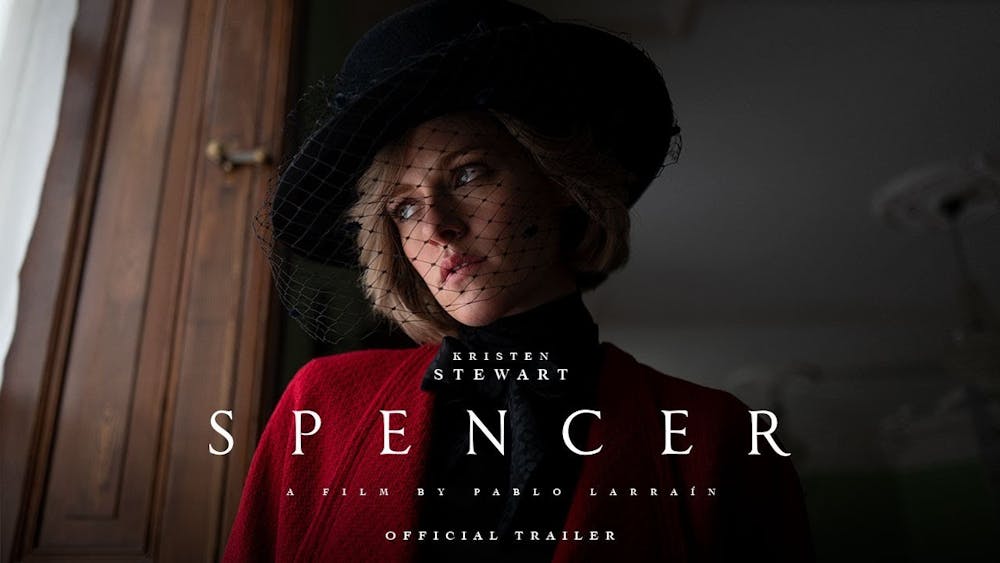Movie: “Spencer”
Director: Pablo Larraín
Starring: Kristen Stewart
Studio: Topic Studios
Rating: 7.6/10
“Spencer” is not the name one typically thinks of when remembering the former princess of Wales. It’s a name associated with a certain ordinariness, of a woman before her devastating marriage and claustrophobic relationship with the royal family.
It’s also the name given to Pablo Larraín’s historical drama centering around Princess Diana’s psychological and physical state over the course of three days during the Christmas holidays of 1991. In this supposed-to-be festive time, Diana finds herself suffering at the Sandringham Estate as she attempts to navigate an eating disorder, a yearning to return to her childhood home, her husband’s affair and the oppressiveness that comes with being a princess.
The film begins with the statement, “a fable from a true tragedy,” which informs the audience that this is not simply a retelling of Diana’s real-life narrative, but an artistic rendition of the days leading up to her divorce with Prince Charles.
However, the movie is less a fable, and more a horror film, evocative of “The Shining,” in its wintry isolation and declining sanity of Diana at the hands of her family in-law.
Tight shots, tense music and graphic depictions of Diana’s bulimia serve to disturb and perturb the audience, making it at once a film that requires great strength to watch, but also great strength to look away.
One of the shining moments in “Spencer” is the Christmas Eve dinner scene. Here, the surrealism and horror of the film comes to a height: Diana confronts her eating disorder head on as she struggles to eat her meal and the Royal Family stares her down, silent and suffocating.
The scene quickly derails into a vision that can only be described as grotesque and haunting. Diana sees the distraught ghost of Anne Boleyn among the dinner guests, glaring at her, as the others do. Then, Diana imagines herself tearing away her pearl necklace, a gift from her husband, and the same necklace he gave his mistress; the pearls fall into her food and Diana scarfs it all down.
The shots of Stewart as she chokes down the large soup-covered pearls, desperately and achingly, are uncomfortably close and near voyeuristic. They perfectly capture the spectacle and depth of pain that Diana faces as part of the Royal Family.
It’s a recoiling moment, one that punches deep in the gut and solidifies “Spencer” as not merely a historical tragedy, but as a true psychological horror film based in some obscene reality.
With the introduction of Boleyn’s apparition in this scene, also comes a more varying motif.
The handling of Boleyn as a haunting presence in Diana’s life begins successfully, and is handled with enough subtlety as to build a parallel between the two royals’ lives, without feeling overstated.
However, as Boleyn becomes a greater force in the movie, her influence wanes. When Boleyn begins to speak, the performance and meaning of the figure verges on the territory of tacky.
It’s an unfortunate mishandling of an otherwise powerful storytelling element.
The last quarter of the movie further displays the film’s faults.
While the majority of the film situates the audience in a place of deep darkness, duress and dangerous discomfort, the final moments take a jarring turn in tone.
In a moment meant to be emblematic of Diana regaining control of her life and happiness against the oppressiveness of royalty, the princess drives her sons away from Sandringham Estate, with the trio free and alive as they sing “All I Need Is a Miracle” by Mike & The Mechanics.
However, rather than delivering emotions of liberation, the abrupt transition from the heaviness of Diana’s previous derailment to this sitcom-adjacent scene, proves overly shocking and incohesive.
It is not necessarily joy without precedent, but the corny levity contrasts almost comically with the beginnings of the film.
What this change in tone does bolster is Stewart’s performance.
It is difficult throughout the film to discern the quality of Stewart’s depiction of Diana. There are times when she effortlessly captures the torment and entrapment that the princess must be feeling. Yet, there are also moments when Stewart’s awkward head and body-tilting create an unnecessary melodrama.
Any doubts that Stewart did not deliver on Diana, however, are dismissed upon Stewart’s performance in this more lighthearted ending.
Here, Stewart effortlessly embodies a realistic and palpable spirit of Diana in her gleeful laughs, maternal warmth and self-created confidence.
She radiates a kind of acting magic that is sporadically missing in the more emotionally weighted scenes.
Overall, “Spencer” is a film that deals in juxtapositions. There are times when these opposites are handled with finesse and care, as in creating spaces that are meant to bring happiness (such as the Christmas setting), but serve only to generate coldness and isolation. Then, there are times when this contrast is too obvious and heavy-handed.
It’s a haunting and disturbing window into Diana’s mental anguish against forces that see her not as a person, but a pawn in a game of public image and tradition. Yet, the weight of this story strays in a mishandled finale.
Kara Anderson is the assistant arts editor and can be reached at kara.anderson@ubspectrum.com

Kara Anderson is a senior arts editor at The Spectrum. She is an English and Spanish double major and is pursuing a certificate in creative writing. She enjoys baking chocolate chip cookies, procrastinating with solitaire and binging reality TV on the weekends.





